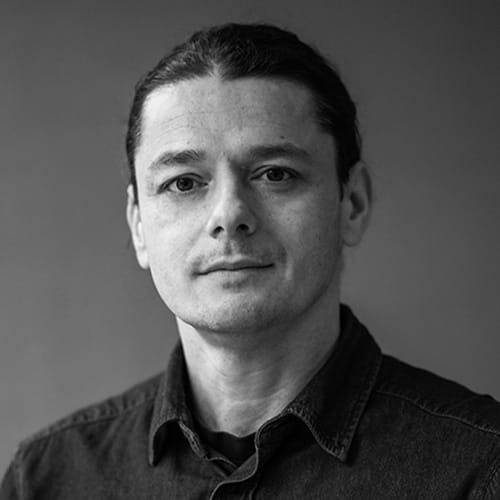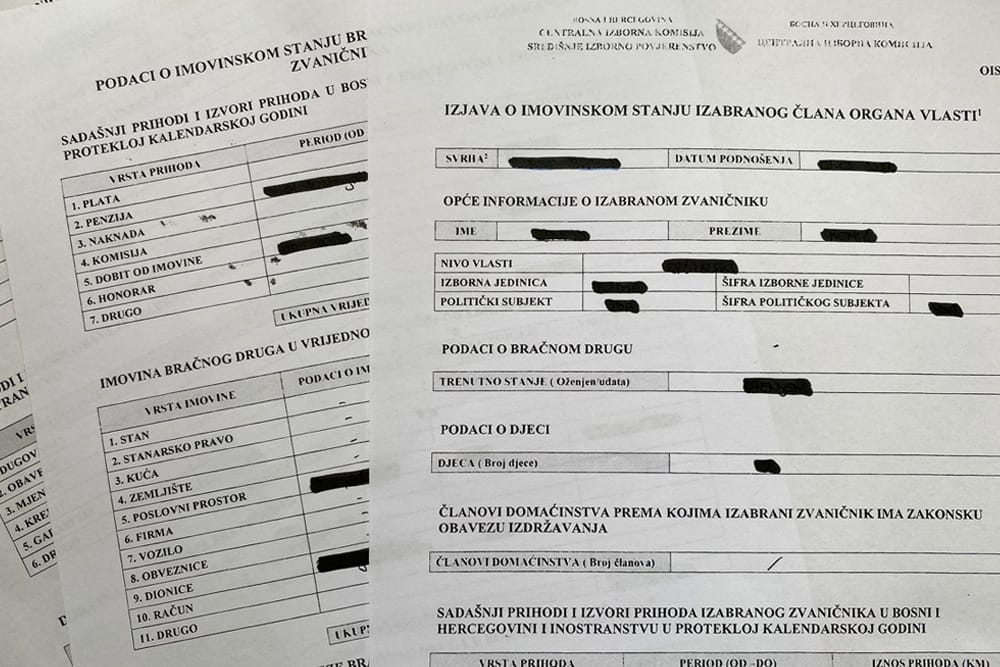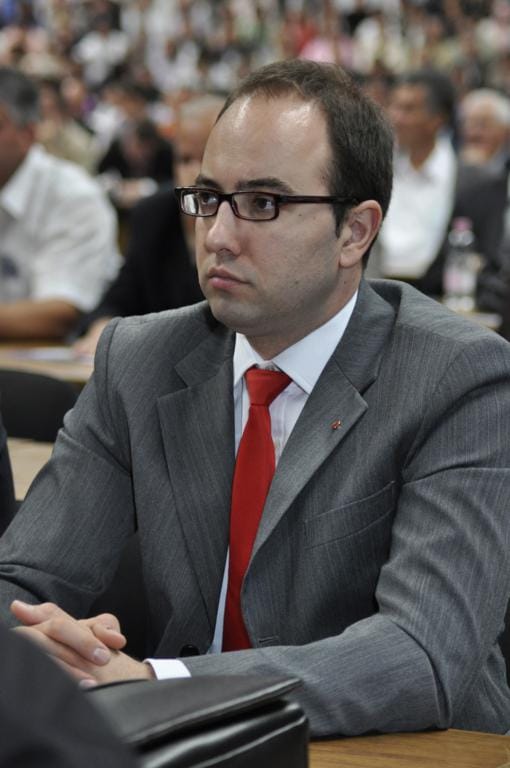A number of Bosnian politicians have not fully disclosed their income and holdings in legally required asset-disclosure forms.
Reporters from the Center for Investigative Reporting in Sarajevo (CIN) found that the candidates for the 2010 General Elections routinely disclosed less income than they earned on the forms, known as asset cards, and some failed to disclose flats, company ownership, shares, large plots of land and other holdings.
Once politicians’ nominations for any office at the state or entity level get accepted by the Central Election Commission (CIK), they must by law fully disclose theirs and their family members’ assets and income. According to Bosnia-Herzegovina (BiH) Election Law, every candidate has an obligation to report the full amount and the source of their last year’s income, as well as the value of houses, flats, land, companies, business premises and cars that they own. They are also bound to report savings, money deposited in bank accounts, and the value of shares, bonds and debts.
CIK’s spokeswoman Maksida Pirić said that in practice the law is interpreted this way: politicians are allowed the discretion to decide whether to list everything they own. ‘If they don’t do it, we cannot punish them because of that.’
CIN reporters compared candidate asset cards against payroll lists from the BiH Parliamentary Assembly and the Parliament of Federation BiH (FBiH), BiH Ministry of Finance and Treasury records, company registers and land registers, to establish the accuracy and thoroughness of the assets cards submitted in advance of this fall’s elections. A sample of 120 politicians from the governing and opposition parties was examined.
For example, 35 of the officeholders from the BiH Parliament, FBiH Parliament and BiH Council of Ministers have failed to report at least 400,896 KM in revenue they had made during 2009. Shares worth more than a half-million KM have not been reported by the candidates of the Party of Democratic Action (SDA) and candidates of the Alliance of Independent Social Democrats (SNSD) have the least amount of reported assets.
Nail Šećkanović, minister of traffic and communication failed to report the market value of his shares in one company and Fuad Kasumović, deputy minister of BiH Finances and Treasury, failed to report on shares in two companies.
In his 2010 asset card, Šećkanović reported 280,000 KM worth of shares in a Srebrenik-based Ingram, a company that produces stone, concrete structures and lime.
According to the FBiH Securities Commission, he owns 28,159 shares valued at 506,870 KM in the company. The market value according to data on Sarajevo Stock Exchange from the last day of trading, February 4, 2010 was even higher, 732,145 KM.
In his 2010 asset card Kasumović reported owning shares in two Zenica-based companies worth 20,000 KM.
According to the FBiH Securities Commission, he owns 36,829 shares (2.55 percent) of Dionis, a catering and trading company, and 2,514 shares (7.9 percent) of Gradnja, a construction company. The Dionis company is under receivership and Kasumović told CIN reporters that the shares of Dionis company are worthless. The shares of Gradnja company on the last day of trading Aug. 9, 2007, amounted to 25,140 KM.
But Kasumović also failed to report that he held 11,675 shares (3.86 percent) of Travnik-based hotel Lipa, and 31,186 shares (6.88 percentage) of Bugojno-based Kalin, hotel and tourism company and 9,261 shares (1.98 percentage) of Zenica-based meat company Zmajevac.
Zmajevac is also in receivership. The market value of the other two companies according to Sarajevo Stock Exchange on the last day of trading March 11, 2010, and June 12, 2009, was 2,538 KM and 13,722 KM respectively.
Companies in receivership apart, Kasumović reported the value of his shares at 71,400 KM below actual worth.
Kasumović said he was aware that he had been mentioned in the securities registry as a shareholder of the companies but he said that list is inaccurate. ‘Those companies were sold four, five years ago and the shares are no longer in my possession,” he said. “I’m a rich man and there’s no need for me to lie.’
Officials of the FBiH Registry of Securities said records on their web page are updated daily and are official.
Minister Šečkanović was unavailable for interview with a CIN reporter.
Undeclared assets
Lazar Prodanović, an SNSD legislator in the House of Representatives of the BiH Parliament, reported in his asset card that he owned an apartment, chalet and business premises.
He failed to report that he co-owned with his brother Vujadin an estate of 63,548 square meters which includes grazing land, meadows, forests, arable land and orchards and a 50-square meter house in the municipality of Bratunac.
His party colleague Ilija Vujičić, a deputy in the RS National Assembly, reported in his asset card owning a flat, land, and Flor, a company that specializes in production of undertakers’ equipment. He did not report owing two business premises and surrounding land totaling 3,198 square meters or a construction company named Flo-Granit.
The chairman of the BiH Council of Ministers and of the SNSD Nikola Špirić also was not thorough with his disclosures.
He listed on his asset card his three-and-half room apartment in Banja Luka, his two-and-half-room flat in Novi Sad, a family estate and the €48,060, $38,600 and 85,000 KM in three bank accounts. He did not list an apartment he owns in Sarajevo with his wife Nada and two garages in Banja Luka.
Špirić said he sold the apartment, but according to Municipal Court in Sarajevo he and his wife are still the owners. The Court dismissed the request of a third party to register the apartment in their name.
Vjekoslav Bevanda, a candidate of the Croatian Democratic Community (HDZ) and the FBiH minister of finances didn’t report in his 2010 asset card a 90-square-meter apartment he owns with his wife Ljiljana on Mostar’s Stjepan Radić street.
Underreported income
CIN reporters found some wide gaps between the total income which some representatives and delegates reported on their asset cards and the amounts paid out to them.
The card of HDZ’s Slavko Matić, a member of the BiH Parliament, contained a gap of 32,881 KM, the largest CIN found. According to Parliament records, Matić received a total of 92,557 KM in 2009. In his 2010 asset card Matić only declared 50,796 KM as his salary and a fee of 8,880 KM.
His party colleagues also had gaps: Velimir Jukić failed to report 24,588 KM, Marinko Čavara 24,302 KM, Mato Franjičević 20,342 KM, and Katica Čerkez 15,610 KM of their 2009 income.
SDA representatives in the FBiH Parliament and the BiH Parliament, Šemsudin Mehmedović, Husein Nanić, Ibrahim Nadarević, Muhamed Ibrahimović, and Halid Genjac also earned much bigger amounts than were reflected in the asset cards.
Mehmedović underreported his income by 25,251 KM, Nanić by 23,040 KM, Nadarević by 20,752 KM, Ibrahimović by 19,181 KM, and Genjac by 10,073 KM.
Some opposition delegates also underreported income. Mladen Ivanić, president of the Party of Democratic Progress and a candidate for a member of BiH Presidency underreported his income by 14,100 KM.
SDP legislators in the FBiH Parliament, Damir Mašić and Aida Brčić, also failed to report a part of their income in 2009. Mašić didn’t report 19,241 KM, and Brčić 10,646 KM.
A number of members of BiH Parliamentary Assembly underreported their income including SNSDs Drago Kalabić (underreported by 12,019KM), Milica Marković (underreported by 10,324 KM), Dušanka Majkić (underreported by 10,805 KM), and a member of the Party for BiH Beriz Belkić (underreported by 9,257 KM). Belkić attributed the error to Parliamentary administration who he said did not report full figures to him. BiH minister for civil affairs and SDA member Senad Šepić also underreported income by 10,063 KM.
CIN was unable to obtain public payroll records for delegates to the RS National Assembly in 2009. Assembly’s Secretary General Ranko Karapetrović responded to CIN’s request for this information by enumerating the items for which deputies get paid and the average salary of delegates. He gave no elaboration about how much each delegate received for his work.
CIN also contacted the RS Department for Zoning, Property and Legal Affairs in Banja Luka requesting information on politicians’ assets. The department refused to provide information saying it was unfair for CIN to request information from some and not all politicians.














